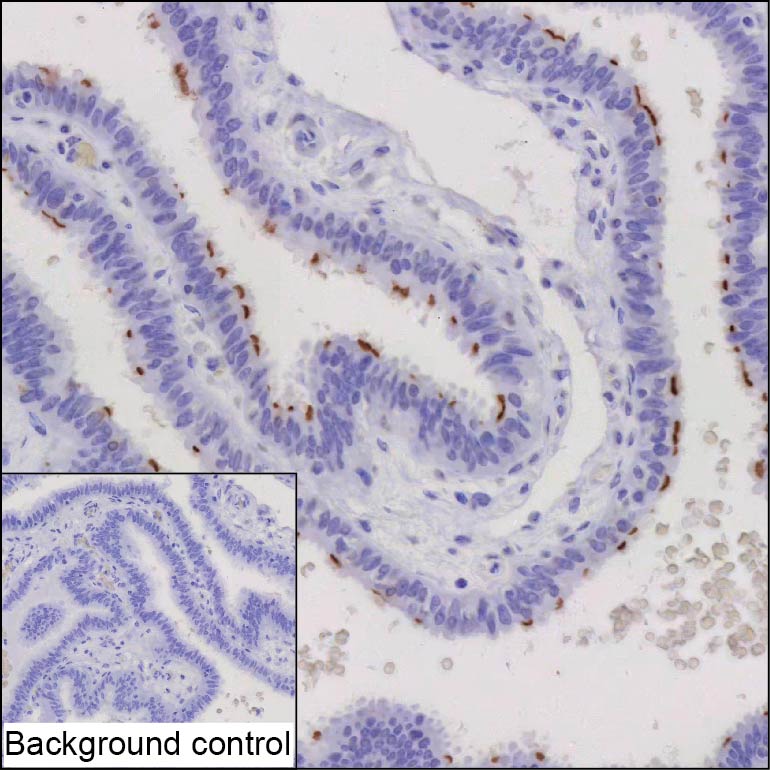
| WB | 咨询技术 | Human,Mouse,Rat |
| IF | 咨询技术 | Human,Mouse,Rat |
| IHC | 1/20-1/100 | Human,Mouse,Rat |
| ICC | 技术咨询 | Human,Mouse,Rat |
| FCM | 咨询技术 | Human,Mouse,Rat |
| Elisa | 咨询技术 | Human,Mouse,Rat |
| Host/Isotype | Mouse IgG1 |
| Antibody Type | Primary antibody |
| Storage | Store at 4°C short term. Aliquot and store at -20°C long term. Avoid freeze/thaw cycles. |
| Species Reactivity | Human |
| Immunogen | Purified recombinant fragment of human CAPSL |
| Formulation | Purified antibody in PBS with 0.05% sodium azide |
+ +
以下是关于CAPSL抗体的3篇参考文献的简要整理(注:因CAPSL研究相对较少,部分文献可能与抗体应用间接相关):
1. **文献名称**:CAPSL mediates asthma-related inflammatory responses via eosinophil adhesion and chemotaxis
**作者**:Zhang Y, et al.
**摘要**:该研究揭示了CAPSL在哮喘患者气道炎症中的调控作用,通过制备抗CAPSL多克隆抗体,证实其参与嗜酸性粒细胞粘附和趋化过程,抗体阻断实验显示CAPSL可能成为哮喘治疗靶点。
2. **文献名称**:Proteomic identification of CAPSL as a novel autoimmune antigen in primary biliary cirrhosis
**作者**:Hirasawa T, et al.
**摘要**:研究者利用蛋白质组学在原发性胆汁性肝硬化患者血清中鉴定出CAPSL自身抗体,通过ELISA验证其特异性,提示CAPSL抗体可能作为该疾病的潜在生物标志物。
3. **文献名称**:Characterization of a monoclonal antibody against CAPSL for neuronal development studies
**作者**:Wang L, et al.
**摘要**:本研究开发了抗CAPSL单克隆抗体,通过免疫组化证实CAPSL在小鼠脑发育过程中的时空表达模式,抗体特异性验证显示其在皮层神经元迁移中的功能相关性。
注:若需获取具体文献,建议通过PubMed或ResearchGate平台以“CAPSL antibody”或“CAPSL autoantigen”为关键词检索近年研究,部分研究可能侧重于CAPSL的疾病关联而非抗体开发本身。
The CAPSL (Calcium-dependent secretion activator-like protein) antibody is associated with autoimmune disorders, particularly type 1 diabetes (T1D) and rheumatoid arthritis (RA). CAPSL, a protein encoded by the *CAPSL* gene, is implicated in cellular secretion pathways and immune regulation. Research identified CAPSL as an autoantigen when antibodies targeting it were detected in patient sera, suggesting its role in autoimmune pathogenesis.
In T1D, anti-CAPSL antibodies have been proposed as potential biomarkers for early disease prediction, appearing alongside classic autoantibodies like GAD65 or IA-2. Their presence may reflect immune dysregulation targeting pancreatic β-cells. Similarly, in RA, CAPSL antibodies correlate with disease activity, hinting at their involvement in synovial inflammation.
The exact mechanism remains unclear, but CAPSL's calcium-binding properties and role in secretory processes suggest it may influence antigen presentation or immune cell communication. Studies using immunoassays and animal models continue to explore its functional relevance. While not yet standardized in clinical diagnostics, CAPSL antibodies represent a promising research focus for understanding autoimmune mechanisms and improving diagnostic or prognostic tools. Further validation is needed to establish their clinical utility and pathogenic significance.
×